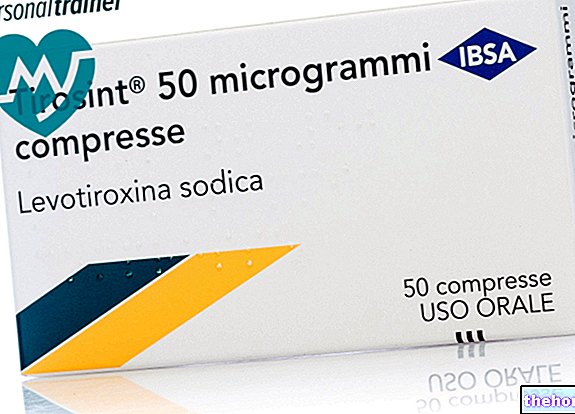Active ingredients: Vitamins of group B
Becozym gastro-resistant tablets
Why is Becozym used? What is it for?
Becozym belongs to the therapeutic category of vitamins, based on complex B.
Becozym is used to prevent vitamin B deficiency:
- in case of increased need for B vitamins (for example during pregnancy or breastfeeding
- in case of insufficient absorption of vitamins B (digestive disorders),
- in case of food imbalances (uniform diets)
It is also used in the treatment of:
- glossitis (inflammation of the tongue),
- cheilitis (inflammation of the lips),
- anorexia - loss of appetite - (for example during a febrile illness) with weight loss
- growth retardation of the child,
- asthenia (weakness),
- in case of prolonged antibiotic therapy,
- disorders of intestinal absorption in the course of gastrointestinal diseases,
- as an adjuvant in hepatopathies (liver diseases) and neuritis (inflammation of nerves, accompanied by pain and numbness),
- treatment of the after-effects of chronic alcoholism attributable to a vitamin deficiency.
Contraindications When Becozym should not be used
Do not take Becozym
- if you are allergic to the active substance or any of the other ingredients of this medicine (listed in section 6).
Precautions for use What you need to know before taking Becozym
Talk to your doctor or pharmacist before taking Becozym.
Do not exceed the recommended dose.
Becozym should be used for the treatment of vitamin B12 deficiency only if it is of food origin and not in patients with atrophic gastritis (inflammation of the lining of the stomach), ileus (intestinal) or pancreatic disorders and gastrointestinal malabsorption of the vitamin. B12 or intrinsic factor deficiency (substance produced by the stomach essential for the absorption of vitamin B12).
Yellow discoloration of urine after Becozym administration is due to vitamin B2 (riboflavin)
Interactions Which drugs or foods may change the effect of Becozym
Tell your doctor or pharmacist if you are taking, have recently taken or might take any other medicines, including medicines obtained without a prescription.
There are no known interactions of clinical significance for the B complex factors, except that vitamin B6 counteracts the activity of levodopa.
Patients receiving other mono- or multivitamin preparations, any other medicines or therapy, should consult a doctor before taking this medicine.
Warnings It is important to know that:
Pregnancy and breastfeeding
If you are pregnant or breast-feeding, think you may be pregnant or are planning to have a baby, ask your doctor or pharmacist for advice before taking this medicine.
Becozym should only be administered during pregnancy when clinically indicated.
Becozym contains lactose and sucrose
The medicine contains lactose and sucrose so in case of ascertained intolerance to sugars contact your doctor before taking the medicine.
Dosage and method of use How to use Becozym: Dosage
Always take this medicine exactly as described in this leaflet or as directed by your doctor or pharmacist. If in doubt, consult your doctor or pharmacist.
The recommended dose is:
Adults and children over 12 years:
For curative purposes: 2-3 gastro-resistant tablets per day.
In antibacterial treatments: as a preventive treatment, 1 gastro-resistant tablet per day.
Oral use. Swallow the gastro-resistant tablets without chewing them, with some liquid.
Use in children
Becozym is not recommended for children under 12 years of age.
Overdose What to do if you have taken too much Becozym
When used correctly, this product does not result in overdose. Almost all overdose reports are associated with concomitant intake of high-dose mono- or multivitamin preparations.
Initial non-specific symptoms, such as confusion, and gastrointestinal disturbances, such as constipation, diarrhea, nausea and vomiting, could be indicative of an acute overdose.
Daily administration of more than 200 mg of vitamin B6 (pyridoxine) (corresponding to more than 20 Becozym tablets per day) for several months can result in symptoms of neuropathy (a disease of the nervous system). If these symptoms appear, stop treatment and consult a doctor.
If you accidentally take an overdose of Becozym, notify your doctor immediately or go to the nearest hospital.
If you have any further questions on the use of this medicine, ask your doctor or pharmacist.
Side Effects What are the side effects of Becozym
Like all medicines, this medicine can cause side effects, although not everybody gets them.
The adverse reactions listed below derive from spontaneous reports and therefore it is not possible to organize them by frequency categories.
Gastrointestinal disorders
Abdominal or gastric discomfort, constipation, vomiting, diarrhea, nausea.
Disorders of the immune system
Allergic reactions. Symptoms may include hives, edema (fluid buildup) of the face, dyspnoea (difficulty in breathing), erythema (redness of the skin), rash, blisters and anaphylactic shock (severe allergic reaction which usually presents with itchy rash with swelling of the throat, difficulty in breathing and drop in blood pressure). If an allergic reaction occurs, stop treatment and consult a doctor.
Nervous system disorders
Headache (headache)
Renal and urinary disorders
Chromaturia (urine staining)
Skin and subcutaneous tissue disorders
Itching, erythema (redness of the skin) *, blisters *
Respiratory, thoracic and mediastinal disorders *
Dyspnea (difficulty in breathing) * Only as a manifestation of an allergic reaction
Compliance with the instructions contained in the package leaflet reduces the risk of undesirable effects.
Reporting of side effects
If you get any side effects, talk to your doctor or pharmacist. This includes any possible side effects not listed in this leaflet. You can also report side effects directly via the national reporting system, https://www.aifa.gov.it/content/segnalazioni-reazioni-avverse
By reporting side effects you can help provide more information on the safety of this medicine.
Expiry and Retention
Keep this medicine out of the sight and reach of children.
Do not use this medicine after the expiry date which is stated on the package. The expiry date refers to the last day of that month.
Do not store above 30 ° C.
Do not throw any medicines via wastewater or household waste. Ask your pharmacist how to throw away medicines you no longer use. This will help protect the environment.
What Becozym contains
- The active ingredients are: thiamine nitrate (Vit. B1), riboflavin (Vit. B2), nicotinamide, pyridoxine hydrochloride (Vit. B6), calcium pantothenate, cyanocobalamin (in the form of Vit. B12), biotin. One gastro-resistant tablet contains thiamine nitrate (Vit. B1) 15 mg, riboflavin (Vit. B2) 15 mg, nicotinamide 50 mg, pyridoxine hydrochloride (Vit. B6) 10 mg, calcium pantothenate 25 mg, cyanocobalamin 10 mcg (in the form of Vit . B12 0.1% WS), biotin 150 mcg.
- The other ingredients are: lactose monohydrate, light magnesium oxide, povidone K90, talc, magnesium stearate, sucrose, methacrylic acid ethyl acrylate copolymer (1: 1), macrogol 6000, red iron oxide (E 172), black iron oxide (E 172) , yellow iron oxide (E 172), cocoa flavor, ethylvanillin, rice starch, dried nebulized gum arabic, solid paraffin, light liquid paraffin.
Description of what Becozym looks like and contents of the pack
Becozym gastro-resistant tablets: 20 gastro-resistant tablets.
Source Package Leaflet: AIFA (Italian Medicines Agency). Content published in January 2016. The information present may not be up-to-date.
To have access to the most up-to-date version, it is advisable to access the AIFA (Italian Medicines Agency) website. Disclaimer and useful information.
01.0 NAME OF THE MEDICINAL PRODUCT
BECOZYM FOOD-RESISTANT TABLETS
02.0 QUALITATIVE AND QUANTITATIVE COMPOSITION
One gastro-resistant tablet contains: thiamine nitrate (Vit. B1) 15 mg, riboflavin (Vit. B2) 15 mg, nicotinamide 50 mg, pyridoxine hydrochloride (Vit. B6) 10 mg, calcium pantothenate 25 mg, cyanocobalamin 10 mcg (in the form of Vit. B12 0.1% WS), biotin 150 mcg.
For the full list of excipients, see section 6.1.
03.0 PHARMACEUTICAL FORM
Gastro-resistant tablet.
04.0 CLINICAL INFORMATION
04.1 Therapeutic indications
Prophylactic administration of Becozym is indicated in case of increased need for B vitamins (e.g. pregnancy, breastfeeding), insufficient absorption (digestive disorders), dietary imbalances (uniform diets), ie in all cases in which the " body runs the risk of not getting enough vitamin B.
Glossitis, cheilitis, anorexia (for example in the course of febrile illnesses) with weight loss, growth retardation of the child, asthenia, in case of prolonged antibiotic therapy, intestinal absorption disorders in the course of gastro-enteric affections.
As an adjuvant in liver disease and neuritis, treatment of the after-effects of chronic alcoholism attributable to a vitamin deficiency.
04.2 Posology and method of administration
Adults and children over 12 years old
For curative purposes: 2-3 gastro-resistant tablets per day, attack dose in case of symptoms of marked deficiency or insufficient absorption (for example following diarrhea, enteritis, steatorrhea, sprue).
In antibacterial treatments: as a prophylactic, 1 gastro-resistant tablet per day.
Becozym is not recommended for children under 12 years of age.
Method of administration
Oral use.
Swallow the gastro-resistant tablets without chewing them, with some liquid.
04.3 Contraindications
Hypersensitivity to the active substance or to any of the excipients listed in section 6.1.
04.4 Special warnings and appropriate precautions for use
The yellow discoloration of the urine after administration of Becozym is due to vitamin B2 (riboflavin).
Do not exceed the recommended dose.
Patients receiving other mono- or multivitamin preparations, any other medicines or therapy, should consult a doctor before taking this medicine.
Becozym should be used for the treatment of vitamin B12 deficiency only if it is of food origin and not in patients with atrophic gastritis, ileus or pancreatic disorders and gastrointestinal malabsorption of vitamin B12 or intrinsic factor deficiency.
The medicine contains lactose therefore patients with rare hereditary problems of galactose intolerance, lactase deficiency or glucose-galactose malabsorption should not take this medicine.
The medicine contains sucrose therefore patients with rare hereditary problems of fructose intolerance from glucose-galactose malabsorption or sucrase-isomaltase insufficiency should not take this medicine.
04.5 Interactions with other medicinal products and other forms of interaction
There are no known interactions of clinical significance for the B complex factors, except that vitamin B6 antagonizes the activity of levodopa.
In any case, patients receiving any other medicine or therapy should consult a doctor before taking this medicine.
04.6 Pregnancy and lactation
Becozym should only be administered during pregnancy when clinically indicated.
04.7 Effects on ability to drive and use machines
Becozym does not affect the ability to drive or use machines.
04.8 Undesirable effects
The adverse reactions listed below derive from spontaneous reports and therefore it is not possible to organize them by frequency categories.
Gastrointestinal disorders
Abdominal or gastric discomfort, constipation, vomiting, diarrhea, nausea.
Disorders of the immune system
Allergic reaction. Symptoms may include hives, face edema, dyspnoea, erythema, rash, boils, and anaphylactic shock. If an allergic reaction occurs, stop treatment and consult a doctor.
Nervous system disorders
Headache
Renal and urinary disorders
Chromaturia
Skin and subcutaneous tissue disorders
Itching, erythema *, blisters *
Respiratory, thoracic and mediastinal disorders *
Dyspnea
* Only as a manifestation of an allergic reaction
Reporting of suspected adverse reactions
Reporting of suspected adverse reactions occurring after authorization of the medicinal product is important as it allows continuous monitoring of the benefit / risk balance of the medicinal product. Healthcare professionals are asked to report any suspected adverse reactions via the national reporting system. "address https://www.aifa.gov.it/content/segnalazioni-reazioni-avverse.
04.9 Overdose
When used correctly, this product does not result in overdose.
Almost all overdose reports were associated with concomitant intake of high-dose mono- or multivitamin preparations.
Nonspecific initial symptoms, such as confusion, and gastrointestinal disturbances, such as constipation, diarrhea, nausea and vomiting, could be indicative of an acute overdose.
The daily administration of more than 200 mg of vitamin B6 (pyridoxine) (corresponding to more than 20 Becozym tablets per day) for several months can give rise to symptoms of neuropathy. If these symptoms appear, stop treatment and consult a doctor.
05.0 PHARMACOLOGICAL PROPERTIES
05.1 Pharmacodynamic properties
Pharmacotherapeutic group: unassociated vitamin B complex.
ATC code: A11EA.
Becozym is an "association of important factors of the vitamin B complex which, as constitutive elements of enzymatic systems, have a regulatory function at different stages of protein, lipid and carbohydrate metabolism. Each component has a" specific biological importance.
A deficiency of vitamins of the B complex therefore leads to a deficit of coenzymes, with a consequent reduction of enzymatic activities, in particular of energy metabolism. Due to the multiple participation of B vitamins in the intermediate metabolism, the deficiency of one or more factors disrupts various metabolic reactions.
05.2 "Pharmacokinetic properties
Vitamin B 1: absorption in the intestine occurs by sodium-dependent active transport and by passive diffusion. Thiamine is then stored in the tissues until saturation and then excreted in the urine as pyrimidine derivative or in unchanged form.
Vitamin B 2: it is phosphorylated in the intestine during absorption and transported to the tissues until saturation. It is eliminated almost exclusively via the urine.
Vitamin B 6: is easily absorbed in the intestine. In the liver, 4-pyridoxic acid is formed, which is the main excretion product. It derives from the action of hepatic aldehyde-oxidase on pyridoxal, a substance into which pyridoxine is transformed in the organism.
Vitamin PP: intestinal absorption is normally very efficient. In the organism it is converted into a coenzyme and excreted mainly in the form of methylated derivatives.
Vitamin H: easily absorbed in the small intestine, it is present in all cells and is eliminated mainly in the urine.
Vitamin B 12: administered orally, cyanocobalamin is absorbed partly by simple diffusion through the intestinal mucosa, partly after binding to intrinsic factor, a glycoprotein of molecular weight 60,000. The vitamin B12-intrinsic factor complex interacts with specific receptors of the ileum mucosa, determining the passage of the vitamin principle into the circulation. Vitamin B12 then binds to plasma globulins, the transcobalamins, to be transported in the tissues and in particular to the liver .
Excretion occurs in small quantities through the bile and mainly through the kidneys.
Vitamin B 5 (pantothenic acid): absorbed in the intestinal tract probably by diffusion it is converted in the tissues into coenzyme A.
05.3 Preclinical safety data
No specific studies have been performed with this product, but the preclinical safety of the individual components is well documented.
06.0 PHARMACEUTICAL INFORMATION
06.1 Excipients
Lactose monohydrate, light magnesium oxide, povidone K90, talc, magnesium stearate, sucrose, methacrylic acid-ethyl acrylate copolymer (1: 1), macrogol 6000, red iron oxide (E 172), black iron oxide (E 172), iron oxide yellow (E 172), cocoa flavor, ethylvanillin, rice starch, dried nebulized gum arabic, solid paraffin, light liquid paraffin.
06.2 Incompatibility
Not relevant.
06.3 Period of validity
3 years.
06.4 Special precautions for storage
Do not store above 30 ° C
06.5 Nature of the immediate packaging and contents of the package
Cardboard box of 20 tablets, in blister packs made of thermoformed material coupled with aluminum tape.
06.6 Instructions for use and handling
No special instructions.
07.0 MARKETING AUTHORIZATION HOLDER
Bayer S.p.A. Viale Certosa 130, 20156 Milan
08.0 MARKETING AUTHORIZATION NUMBER
AIC n ° 005647033
09.0 DATE OF FIRST AUTHORIZATION OR RENEWAL OF THE AUTHORIZATION
Renewal: June 2010
10.0 DATE OF REVISION OF THE TEXT
September 2014




























